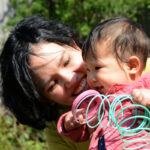 It was a long-held belief that babies are born passive creatures who don’t take much notice of the world until they are a bit older. Now we know that isn’t true. They are keen observers of their world and active participants in it. They know when someone is paying attention to them and when they are distracted. They love taking part in interactions and feel confused if someone else doesn’t want to. They like a good joke. Every single experience a baby has leaves an emotional trace, and the emotional patterns of their life are being woven into the neural pathways of their brain. That brain will develop more rapidly during the first three years than it ever will again. Understanding how babies develop changes how we make sense of their behaviour and how we treat them. And how we treat them shapes how they develop, right down to the biological level.
It was a long-held belief that babies are born passive creatures who don’t take much notice of the world until they are a bit older. Now we know that isn’t true. They are keen observers of their world and active participants in it. They know when someone is paying attention to them and when they are distracted. They love taking part in interactions and feel confused if someone else doesn’t want to. They like a good joke. Every single experience a baby has leaves an emotional trace, and the emotional patterns of their life are being woven into the neural pathways of their brain. That brain will develop more rapidly during the first three years than it ever will again. Understanding how babies develop changes how we make sense of their behaviour and how we treat them. And how we treat them shapes how they develop, right down to the biological level.
Babies
Here are some of the discoveries scientists have made about babies’ capacity for connection:
Our beliefs about babies shape how we treat them. And how we treat babies shapes who they become. So the discoveries that science is making about their innate social abilities matter a lot. Understanding this science helps parents make sense of infant behaviour. Interactions with their baby become richer and more fascinating. Staying up to date with these scientific discoveries is important for the wide range of people who work with babies and new parents, like childcare staff, health visitors, paediatricians, infant massage therapists, speech and language therapists and stroller manufacturers. That’s why connected baby was founded. We want people to understand how deeply the capacity for connection is wired within human beings.
Here’s one of our favourite videos exploring fetal experience:

